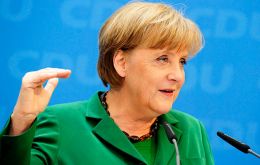MercoPress. South Atlantic News Agency
Tag: Sigmar Gabriel
-
Monday, June 19th 2017 - 14:51 UTC
UK starts Brexit negotiations from a weakened position

Talks between the United Kingdom and the European Union to finalise Britain's exit from the continental block started Monday in Brussels, about one year after Britons voted that their country is to leave the bloc by March 30, 2019. But Europe is determined to set an example so that other countries will not be attracted to the idea, even if it includes leaving an open door for Britain to stay.
-
Monday, August 29th 2016 - 06:49 UTC
Germany admits US/Europe trade talks have failed; growing fears of populism reactions

Talks aimed at setting up a U.S.-European free trade zone have run aground because of intransigence on Washington's part, a top German politician said Sunday. The Obama administration and the 28-member European Union have been in talks to set up the Transatlantic Trade and Investment Partnership, or TTIP, which would be the world's largest free trade zone.
-
Wednesday, September 9th 2015 - 08:23 UTC
Germany willing to take half a million refugees annually over several years

Germany said it could take half a million refugees annually over several years as Greek islands struggled on Tuesday to process a huge backlog of migrants desperate to travel to western Europe. Reflecting deepening concern, the European Union's president warned the EU faced a years-long refugee crisis, while the UN urged countries worldwide to help tackle the problem.
-
Tuesday, June 30th 2015 - 07:14 UTC
EU leaders warn Greeks the referendum vote means “yes or no to the Euro zone”

European leaders have warned Greeks that rejecting creditors' proposals in a snap referendum called for Sunday would mean leaving the Euro. German Vice Chancellor Sigmar Gabriel said the vote would be “yes or no to the Euro zone”.
-
Tuesday, January 6th 2015 - 07:24 UTC
Germany' growing consensus to let Greece drop out of the Euro block

Germany has said it will not be “blackmailed” into renegotiating Greece’s rescue program should a new hard left government take office after elections later this month. The Euro dropped to a nine-year low after a report in Der Spiegel magazine on Monday that Berlin was no longer opposed to Athens leaving the currency bloc.
-
Wednesday, October 15th 2014 - 08:28 UTC
Germany insists with a 2015 balanced budget despite slower growth forecast

German Chancellor Angela Merkel on Tuesday rejected calls for Berlin to ditch its plans for a balanced budget next year and to instead invest more in order to shore up the faltering German and Euro zone economies. On Tuesday Germany slashed its 2014 growth forecast from 1.8% to 1.2%.
-
Monday, April 1st 2013 - 09:32 UTC
Opposition admits it will be hard to beat Chancellor Merkel in September

Germany's two main opposition parties traded warnings against joining forces with Chancellor Angela Merkel's conservatives after September's election if they fail to win their own left-of-centre majority.
